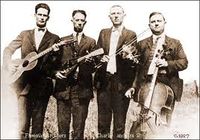Annotation:New Born Blues: Difference between revisions
No edit summary |
No edit summary |
||
| Line 1: | Line 1: | ||
== | __NOABC__ | ||
<div class="noprint"> | |||
<p><font face="Century Gothic" size="4"> Back to [[{{BASEPAGENAME}}]] </font></p> | |||
</div> | |||
---- | ---- | ||
<p><font face=" | {{#lst:{{PAGENAME}}|abc}} | ||
'''NEW BORN BLUES.''' AKA and see "[[Wang Wang Blues (The)]]." | ---- | ||
<div style="page-break-before:always"></div> | |||
<p><font face="Century Gothic" size="2"> | |||
<div style="text-align: justify; direction: ltr; margin-bottom: 90px; margin-left: 70px; margin-right: 120px;"> | |||
<br> | |||
'''NEW BORN BLUES.''' AKA and see "[[Wang Wang Blues (The)]]." American, Country Rag (cut time). C Major. Standard tuning (fiddle). The tune was recorded by the Stripling Brothers band, from Pickins County, Alabama, in 1929, and is a derivative of "The Wang Wang Blues." | |||
[[File:stripling.jpg|200px|thumb|left|The Stripling Brothers band; Charlie Stripling, fiddle]] As with many of their country-blues melodies, "New Born Blues" is in the key of 'C' (although it sounds in B flat, perhaps due to the recording process used). Charlie Stripling himself called such tunes "ragtime breakdowns," according to Joyce Cauthen. | [[File:stripling.jpg|200px|thumb|left|The Stripling Brothers band; Charlie Stripling, fiddle]] As with many of their country-blues melodies, "New Born Blues" is in the key of 'C' (although it sounds in B flat, perhaps due to the recording process used). Charlie Stripling himself called such tunes "ragtime breakdowns," according to Joyce Cauthen. | ||
<br> | <br> | ||
< | </div> | ||
</font></p> | </font></p> | ||
<p><font face=" | <div class="noprint"> | ||
''Source for notated version'': | <p><font face="Century Gothic" size="2"> '''Additional notes''' </font></p> | ||
<p><font face="Century Gothic" size="2"> | |||
<font color=red>''Source for notated version''</font>: - | |||
<br> | <br> | ||
<br> | <br> | ||
</font></p> | </font></p> | ||
<p><font face=" | <p><font face="Century Gothic" size="2"> | ||
''Printed sources'': | <font color=red>''Printed sources''</font> : - | ||
<br> | <br> | ||
<br> | <br> | ||
</font></p> | </font></p> | ||
<p><font face=" | <p><font face="Century Gothic" size="2"> | ||
''Recorded sources'': <font color=teal>Document Records 8007, "The Stripling Brothers Vol. 1 1928 - 1934" (1997. Reissue compilation). Vocalion 5382 (78 RPM), Stripling Brothers (1929, backed with "[[Kennedy Rag]]"). The Red Mountain White Trash - "Chickens Don’t Roost Too High." | <font color=red>''Recorded sources'': </font> <font color=teal> -Document Records 8007, "The Stripling Brothers Vol. 1 1928 - 1934" (1997. Reissue compilation). Vocalion 5382 (78 RPM), Stripling Brothers (1929, backed with "[[Kennedy Rag]]"). The Red Mountain White Trash - "Chickens Don’t Roost Too High." </font> | ||
</font> | |||
<br> | <br> | ||
<br> | <br> | ||
</font></p> | </font></p> | ||
<p><font face=" | <p><font face="Century Gothic" size="2"> | ||
See also listing at:<br> | See also listing at:<br> | ||
Hear the Stripling Brothers' recording on youtube.com [http://www.youtube.com/watch?v=3k7ZfITKUXc], and at Slippery Hill [http://slippery-hill.com/c/NewBornBlues.mp3]<br> | Hear the Stripling Brothers' recording on youtube.com [http://www.youtube.com/watch?v=3k7ZfITKUXc], and at Slippery Hill [http://slippery-hill.com/c/NewBornBlues.mp3]<br> | ||
</font></p> | </font></p> | ||
<br> | <br> | ||
---- | ---- | ||
== | <p><font face="Century Gothic" size="4"> Back to [[{{BASEPAGENAME}}]] </font></p> | ||
</div> | |||
__NOEDITSECTION__ | |||
__NOTITLE__ | |||
Revision as of 21:58, 7 March 2019
X:1 T:New Born Blues S:The Stripling Brothers, Charlie (1896-1966) and Ira (1898-1967), west Alabama. M:C| L:1/8 R:Country Blues D:Vocalion 5382 (78 RPM), The Stripling Brothers (1929) F:https://www.slippery-hill.com/recording/new-born-blues Z:Transcribed by Andrew Kuntz K:C z2g2|[G2e2][^F2_e2][G2=e2][^F2_e2]|[G=e][^F2_e2] [G=e]- [Ge](eg2)|[G2e2][^F2_e2][G2=e2][^F2_e2]| [Ge][F3d3] [Ec]>e g2| [G2e2][^F2_e2][G2=e2][^F2_e2]|[G=e][^F2_e2] [G=e]- [Ge](eg2)|[G2e2][^F2_e2][G2=e2][^F2_e2]| [Ge][F3d3] [Ec]>B A2|| [M:2/4]+slide+GAcG|[M:C|] [G4e4][G4e4]|[F4d4][F4d4]|[E6c6] cd|+slide+[e2e2]+slide+ed cAGF| +slide+ED+slide+ED CA,G,A,|CE2c- cde2|g6 g2|c'2c'2 g2[Ge][^F_e]| [Ge][^F_e][Ge][^F_e] cAGG-|[M:2/4]GA cA|[M:C|][G8e8]|[F8d8]|[E4c4]- [Ec]AGA cd e2| g8|f4- fa[^F2_e]-|[M:6/4][Ge][^F_e][Ge][^F_e] =edcc- cd[e2e2]|[M:C|]g6 g2-| f6cd|e2f2gfga-|[M:2/4]ag e2 |[M:C|][G8e8]|[F8d8]|[M:6/4][E8c8]||
NEW BORN BLUES. AKA and see "Wang Wang Blues (The)." American, Country Rag (cut time). C Major. Standard tuning (fiddle). The tune was recorded by the Stripling Brothers band, from Pickins County, Alabama, in 1929, and is a derivative of "The Wang Wang Blues."

